Charles H. Reynolds served as department head from 1980 – 2001. In the wake of his passing on January 25, 2017 [TN Today | Knoxville News-Sentinel] the Department decided to create an award in his honor. Because he stayed connected to many of his former students, we decided to honor a distinguished alumnus or alumna each year. The award is handed out at the Graduation and Awards Ceremony in the spring.
2024 Recipient – Larry Sykes
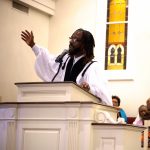
This year’s award was given to Rev. Larry Sykes, Jr., who graduated from the Department in 2009 and went on to earn a Master of Divinity from The Southern Baptist Theological Seminary in Louisville, KY. Associate Professor Rachelle Scott remembers Rev. Sykes in the classroom: “in the classes that Larry took with me, he always brought a level of serious reflection to the material, and he demonstrated over and over again a genuine level of concern for his fellow classmates.” Rev. Sykes is currently the Senior Pastor at Clay Street Baptist Church in Shelbyville, Kentucky, and has received significant recognition over the past few years for his generous and ongoing social justice work in the wider community. Recipient of numerous accolades, including the Clyde T. Francisco Preaching Awards, the Garland K. Offutt Award for Distinction in Church Leadership, the Outstanding Community Leader Award for District 25 of the Louisville Metro Council Government, Rev. Sykes has been a vitally important leader for his community by fighting poverty and racism at home and abroad.
2023 Recipient – Steven Trotter
Steven M. Trotter is a native of Knoxville, Tennessee, and has worked at the U.S. Department of Energy facilities in Oak Ridge, Tennessee, since 1979. He graduated from UT in 1976, and subsequently acquired M.S. and Ph.D. degrees from the Department of Civil and Environmental Engineering in 1988 and 1998, respectively. Dr. Trotter is currently employed at Oak Ridge National Laboratory (ORNL) as the environment, safety, health, and quality manager for the Second Target Station Project. This 2.0+ billion dollar project will provide for a major upgrade to the Spallation Neutron Source, one of the world’s foremost research facilities wherein an accelerator-based system delivers short (microsecond) proton pulses to a steel target filled with liquid mercury through a process called spallation. Those neutrons are then directed toward state-of-the-art instruments that provide a variety of capabilities to researchers across a broad range of disciplines, such as physics, chemistry, biology, and materials science. In addition to his responsibilities at ORNL, Dr. Trotter is a nationally recognized subject matter expert within the U.S. Department of Energy and often serves on both national and international review committees.
When I received a congratulatory email from Dr. Christine (Tina) Shepardson notifying me that I had been chosen as this year’s recipient of our Department’s Charles H. Reynolds Distinguished Alumnus Award. I was extremely surprised by this news, somewhat of a loss for words, and deeply appreciative.
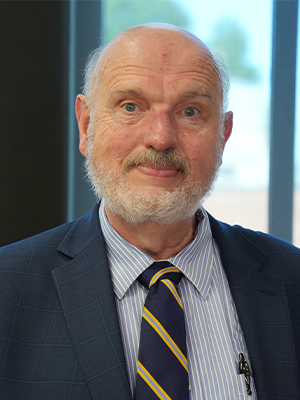
In reflecting on the award, my thoughts turned to my undergraduate years at the University. I was extremely fortunate to have studied religion under David Linge, Jay Kim, and Tom Paton from 1972-1976. In their classes, I was introduced to the writings of Paul Tillich, Huston Smith, Herbert Fingarette, and other notable authors and works. This experience, these remarkable teachers, and the enlightening coursework left an indelible impression upon me. The critical thinking skills that I acquired from reading complex and difficult texts have been directly applicable to interpretation and implementation of designs, policies, and programs encountered throughout my career. In the late 1990’s, I had lunch with a friend, Dr. Bill Balch, and expressed an interest in returning to the study of religion, specifically Christianity. Bill was both an ordained Methodist minister and the licensed counselor for the Holston Conference. Although I had been looking at some on-line programs, Bill encouraged me to return to UT, and specifically to discuss my interests with Linge, David Dungan, and Charlie Reynolds. Of the three, I contacted the one whom I knew, Dr. Linge, who subsequently made arrangements for me to meet with Dungan and Reynolds. The Department of Religious Studies offered a Master’s Program in Philosophy, with a concentration in Religious Studies, and I immediately enrolled in the program. I completed all required studies under the direction and mentorship of Drs. Dungan, Linge, Reynolds, and Hauerwas. In these courses, I began to learn about the relationship between Christianity and Greek philosophy, early Christianity, and Christian ethics. I was introduced to the writings of Joachim Jeremias, Reinhold Niebuhr, H. Richard Niebuhr, Stanley Hauerwas, and many other foundational authors/texts. My training in data interpretation and expression of complex ideas helped me further my career as an engineer, and formal studies in ethics has shaped my approach to ethical challenges posed in my positions at ORNL. It is gratifying to know that current students are receiving this training under the direction of the faculty because this will better prepare them for forthcoming challenges in their careers.
In preparing my notes for the Department’s graduation/awards ceremony, I entered my bedroom where I keep reading material by my bedside. The current texts are Paul Tillich’s The Courage to Be; William James’, The Varieties of Religious Experience, Jeffrey Stout’s Democracy and Tradition, and the current Journal of the Society of Christian Ethics. Thus, the influence of my exposure to Religious Studies, beginning as an undergraduate fifty years ago, in the graduate program twenty years ago, continues to the present.
In closing, I would like for Dr. Linge and Dr. Hauerwas to know the deep appreciation and respect I have for them both as teachers and friends. I hope that Drs. Dungan and Reynolds were aware of my appreciation and respect for them as well. Dr. Reynolds encouraged my joining and participation in the Society of Christian Ethics, and I continue to belong to that Society. Although these men were and are outstanding academics, I also noted their concern and care for people and the environment. Perhaps, that legacy is what is most meaningful to me, Reynolds’s concerns regarding the Vietnam and Gulf Wars (Yes, there was a protest on Kingston Pike at West Town Mall for the latter), but also for individuals – the students, the workers. Linge has continued to work extensively for those in need of better treatment and a living wage. Perhaps, for my former teachers and many of their students, the study of religion has created in us a need to serve.
2022 Recipient – Andrew Hoyal II
Andy Hoyal (’75)
Attorney
Seattle, Washington
This reflection differs somewhat from others because it looks at the department from a distance of fifty years. It is a remembrance of a time and of professors, most of whom have passed, whose influence in shaping the department and its students is still felt.
In 1971, no one came to UT planning to major in Religious Studies. But when I could not get the 12-hour biology course I planned to take that summer, I quickly put together courses meeting liberal arts requirements for my math major, including Lee Humphreys’ excellent class on Ancient Near Eastern Religions. The following year, I took David Dungan’s course on the New Testament and his first-ever class on Images of Jesus. I was hooked. I switched majors and never looked back.
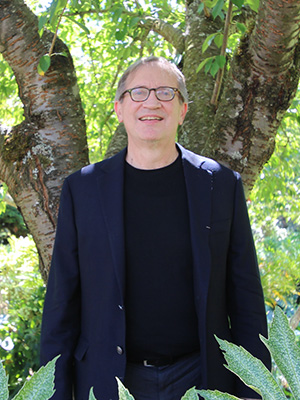
For students such as myself, who had grown up in the religious atmosphere characteristic of the south, religious studies provided the opportunity and tools to critically examine our own perspectives, opening up new worlds. I discovered something else about the department not advertised in the catalog: individual attention and personal relationships. As advisor and teacher, David Dungan discussed with me at length papers and courses and future graduate and professional school options. He was the first person with whom I seriously discussed law school. Through these conversations, I worked through or at least sorted out my personal religious issues. I am profoundly grateful for his patient listening and perceptive guidance. I named my first cat Eusebius.
The department was an exciting place in the early 70s. Ethics scholars from around the country gathered for the inaugural symposium of the Journal for Religious Ethics, founded by Charlie Reynolds. David Linge, with whom I first studied Augustine, brought Hans-George Gadamer to Knoxville for a lecture. Students from philosophy, history, psychology, English, anthropology, and even accounting (!) eagerly spent precious electives on religious studies classes. The lingering effects of the counterculture had their own influence, and all this made for robust classroom discussion.
But it was the department’s requirement that majors take three courses in Asian philosophy and religion that truly changed my life. Professor Jay Kim taught Buddhism from the inside out, so to speak. We learned the “sense” of Buddhist practices, moral precepts, and doctrine. Our papers explicated the Buddhist meaning of the texts. This approach came home to me in a particular incident. As head of our student Religious Studies Association, I helped arrange campus sponsorship for a presentation at the Student Center by a local Hare Krishna group. To my surprise, Professor Kim attended; it was not a department event. The next day, he came up to me before class and commented, “That was a good talk, but I think what we are doing is better.” I had not considered the matter in this light. We were learning to see the world as if we were Buddhist, at least for a quarter.
Jay became my advisor, mentor, and after graduation, a close friend. He had grown up in tumultuous mid-century Korea. At the University of Chicago Divinity School, he was a student of Mircea Eliade, Joseph Kitagawa, and Charles Long in the History of Religions. Jay’s courses at UT ranged from Confucius and Thomas Merton to Buddhism and myth and ports in between. He brought together the Pieta and the Buddhist Kisa Gotami. His premature death at age 47 in 1982 was not only a personal loss to family, friends, and colleagues; it deprived the department and the academy at large of a scholar and thinker who was making a unique contribution to cross-cultural religious studies.
After my graduation, and with the encouragement and support of Jay, David Dungan, and Stan Lusby, our department chair, who was always especially helpful to me, I attended the University of Chicago Divinity School, obtaining a master’s degree. But I eventually went to law school at Vanderbilt and became a lawyer, first in Nashville and then for the last thirty years in Seattle.
My religious studies education proved surprisingly practical. I had learned to write papers firmly grounded in the sources and texts, the ideal training for a lawyer. Dungan’s 5-page limitation on papers seemed particularly onerous at the time. Yet years later, I established myself at my firm by explaining a complex case to a senior lawyer in a page and a half—a skill learned from Dungan.
As a lawyer, I have been fortunate to have handled a wide variety of cases, including school funding and prison conditions in Tennessee, the techniques for aluminum production in France, sophisticated tests for the detection of cancer, and injury to almost every part of the human body. No undergraduate major would have ever prepared me for all of these subjects. However, my religious studies education at UT gave me the ability and confidence to master and explain these diverse subjects to lay audiences of juries and judges throughout my career.
Once Jay told me that I could continue studying religion regardless of how I made a living. And looking back over fifty years, that is what I have done. I acquired the “reading list” at UT and graduate school, and I have never stopped. It has been enough to last a lifetime. And I have learned that by attending to this religious “stuff,” you will run across religious books, practices, and/or communities that will serve as a resource for and make a difference in your own life.
I have never regretted my decision to major in religious studies. I am honored to share my experiences and to receive the Charles H. Reynolds Distinguished Alumnus Award.
2021 Recipient – Kelsey Hicks-Bunns
What does having a degree in Religious Studies mean to me?
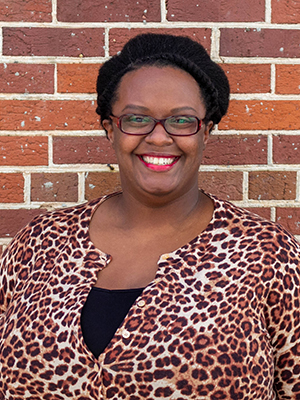
Having a degree in Religious Studies has been richly helpful in my equity and inclusion work. When I see people, my students, their families, I see them as more than their race and their ethnicity; I see them as people whose belief systems may inform their decisions and actions, as people whose family traditions may be prioritized over my advice as an educator, and as people whose voices and experiences need to be centered in our work for it to truly be more equitable and inclusive. One of the things that students do not realize they will gain by majoring in Religious Studies is their greater sense of humanity. While I was raised to be a kind, compassionate, and caring person, I can say that much of that was due to my religious upbringing. I had many misconceptions about people who did not exist the way I did. Learning from Religious Studies professors about their lived experiences was humbling and inspiring. I leaned into the discomfort of the learning process and I continue to do that with the teachers and students I support in my current role. Of course, I am still learning about the profound meaning of religion and spirituality in people’s lives, and I have a solid foundation to continue that learning thanks to the amazing professors in the Department of Religious Studies.
What are my memories from my time at the University of Tennessee?
There were many things in my personal life that affected my success at Tennessee. I experienced the loss of close loved ones every year, battled significant illness that resulted in surgery, and struggled with my own growth and development. Professors in the Religious Studies Department, like Dr. Hackett and Dr. Reynolds, don’t come around often. I could detach myself from the struggles of life and my studies because their classes felt less like obligations and more like excursions to spaces and places I could not physically visit.
One of my fondest memories was volunteering with the Jazz for Justice Project with Dr. Hackett. Meeting women from northern Uganda who came to Knoxville for one of the benefit concerts was empowering, inspiring and enlightening. These women looked like me and the women of my family. I remember speaking to one woman who asked me if I knew where I was from. Between my tears, I told her it had to be from wherever she was from because she looked just like my late grandmother. Without hesitation she grabbed me and hugged me with the strength of a thousand women and the gentleness that only a grandmother could offer. She told me to not let anything stop me – not fear and definitely not a man. She told me I was powerful and that I would go on to do great things. I like to think that she and my grandmother and all of the women they represented have guided me through the nooks and crannies of life to get me right here which is exactly where I am meant to be.
Since graduating from the University of Tennessee in 2019, I obtained my Master of Education in Higher Education Leadership from Mercer University. From there, I have worked at some of the nation’s best institutions of higher learning. I currently serve as the Head of Equity and Inclusion at Atlanta International School. I developed Essentially Kelsey, a collaborative for people to collectively heal from the vicarious trauma of global anti-Blackness.
2020 Recipient – Jennifer (JJ) Rosenbaum
We are proud to honor Jennifer (JJ) Rosenbaum— an attorney, organizer, and human rights strategist advocating for human rights, decent work for all, and fair migration—as our 2020 Charles H. Reynolds Distinguished Alumna.
JJ graduated from the University of Tennessee in 1999 with a College Scholars major, taking coursework like a Religious Studies major and working largely with Dr. Rosalind Hackett, Dr. Mark Hulsether, Dr. Charlie Reynolds, and Dr. Ronald Hopson from our Department’s faculty. Legendary among Department old-timers for being one of the top three or four students we taught during our entire teaching careers, JJ wrote a fine senior project chaired by Dr. Hackett about the role of U.S. fundamentalist agendas in shaping the Religious Freedom Restoration Act (RFRA), and she helped Drs. Hulsether and Hopson co-teach a course called “The Religious Right in Black and White.” She leveraged her exemplary scholarly work and community engagement first into UTK’s most prestigious undergrad honor, the Torchbearer Award, and then a seat amid one of the most selective graduate cohorts in the world, Harvard Law School.
For over two decades, JJ has used legal, policy, and advocacy strategies to win access to rights and collective power for low-wage workers and advised workers’ centers on transnational grassroots collaborations. Currently she is the US director of Global Labor Justice, building on a more than ten-year record in the post-Katrina Gulf Coast where JJ created a new model of movement lawyering as the founding legal and policy director for the National Guestworker Alliance and the New Orleans Workers’ Center for Racial Justice. JJ has litigated cases before trial and appellate courts and led the human, labor, and migrants rights strategy for campaigns including the Signal workers, who exposed labor trafficking from India to the Gulf Coast after Hurricane Katrina, and the Justice @ Hershey’s campaign. She is the union and employee co-chair of the American Bar Association’s International Labor and Employment Committee and lectures on labor migration and comparative social justice lawyering approaches at Harvard Law School. She previously held a Robina Fellowship at the Schell Center for International Human Rights (related to Yale Law School) with a focus on the intersection of global supply chains chains and labor migration.
2019 Recipient – Rick Lowery
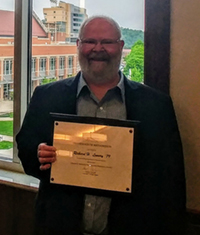
Rick Lowery graduated with honors in Religious Studies from UTK in 1979 and moved north to Yale University, where he completed a Master of Divinity degree in 1982 and a Ph.D. in Religious Studies in 1989. Rick’s longstanding interests have been in the prophetic literature of the Hebrew Bible and questions about how Jewish and Christian moral-political traditions, rooted largely in this tradition, relate to issues of social and ecological justice in the contemporary world. He has published numerous books and articles about these matters, including a recent volume co-authored with William Barber and Liz Theohari’s, Revive Us Again: Vision and Action in Moral Organizing(Beacon, 2018). From 1989 to 2009 he taught Hebrew Bible at Phillips University, and since then he has been affiliated with Christian Theological and Lexington Theological Seminaries, including as Interim Dean at Lexington. Rick has blogged for the Huffington Post. He has served on many high-level committees of the Disciples of Christ and the global ecumenical movement, including the General Cabinet of the Christian Church, from 2017 forward, and the executive committee of the Faith and Order Commission of the World Council of Churches, 2006-2014. In such capacities, he has been part of official delegations to Disciples and WCC global partners throughout the world, including the Middle East, South Korea, the Congo, South Africa, Cuba, Haiti, Brazil, India, and China. Currently he is writing a book about how key stories in Genesis relate to current discussions of faith, eco-justice, human rights, interfaith issues, and international law.
